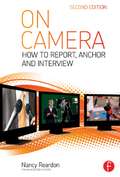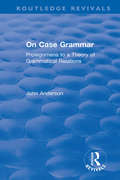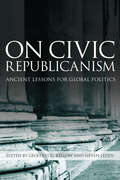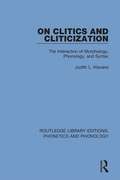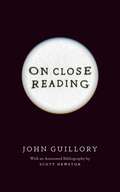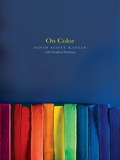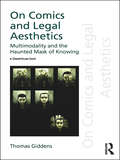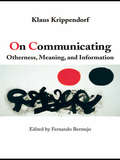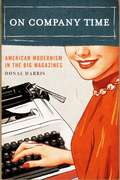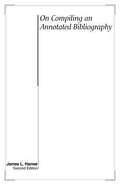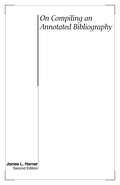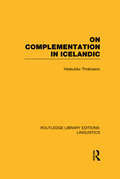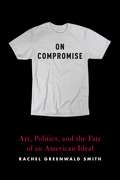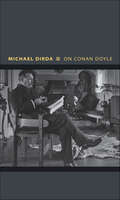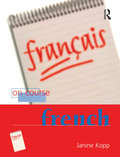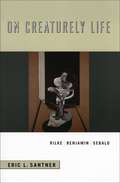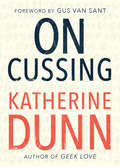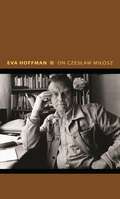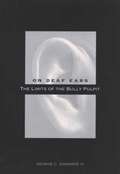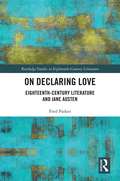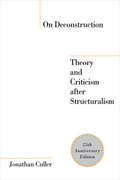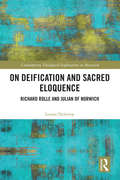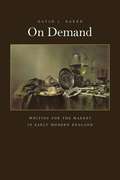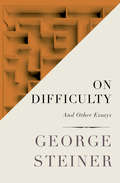- Table View
- List View
On Camera: How To Report, Anchor & Interview
by Tom Flynn Nancy ReardonFrom the Foreword by Bob Schieffer:"This is a real 'how to' book by two people who really know how. But it is more than just a fine manual on broadcast journalism, journalists and non-journalists alike will find it good read, a treasure chest of anecdotes, stories and a tall tale or two from the most exciting profession of all—reporting the news." Reardon’s On Camera: How to Report, Anchor & Interview teaches you how to become professional and effective on camera. You’ll learn how to appear and feel at ease whether doing an interview, reporting in the field, reading from a prompter, or giving a video presentation. It’ll give you the nuts and bolts of how to do the job at the network level or as a backpack journalist, so you feel confident that when you’re standing in front of the camera you will know what you’re doing. Whether new to television or experienced in front of a camera, you will improve on your current skills through career-focused tips and tried-and-true principles—all oriented to skills development—in this book.
On Case Grammar: Prolegomena to a Theory of Grammatical Relations (Routledge Revivals)
by John M. AndersonOriginally published in 1977, On Case Grammar, represents a synthesis of various lines of research, with special regard to the treatment of grammatical relations. Arguments are assessed for and against case grammar, localism, lexical decomposition and relational grammar. The book surveys the important evidence to support the validity of the choice of a case grammar as the most satisfactory of current accounts of the notion of grammatical relations. This evidence is derived from a detailed examination of various processes in English and from a typological comparison of other languages, notably Dyirbal and Basque. The book also looks at the establishment of principled limitation on the set of case relations. Lexical, syntactical, semantic and morphological evidence suggests that the set of cases is in conformity with the predictions of a strong form of the localist hypothesis, which requires that case relations be distinguished in terms of source vs. goal vs. location.
On Civic Republicanism
by Geoffrey Kellow Neven LeddyContinuing the analysis of contemporary issues through the lens of ancient theories beyond the themes of Enduring Empire and the award-winning On Oligarchy, On Civic Republicanism explores the enduring relevance of the ancient concepts of republicanism and civic virtue to modern questions about political engagement and identity. Examining both ancient and early modern conceptions of civic republicanism, the contributors respond to the work of thinkers ranging from Plato and Aristotle to Machiavelli, Montesquieu, and Wollstonecraft.A testament to the continuing influence of the concept and the ongoing scholarly debate which surrounds it, On Civic Republicanism addresses fundamental questions regarding democratic participation, liberal democracy, and the public good. Its essays speak to the many ways in which the idea of the republic still challenges us today.
On Clitics and Cliticization: The Interaction of Morphology, Phonology, and Syntax (Routledge Library Editions: Phonetics and Phonology #13)
by Judith L. KlavansFirst published in 1995. This investigation shows that cliticization is not a totally unified phenomenon. Asymmetries in the behaviour of phonological and syntactic clitics show that no single principle predicts all clitic behaviour. The study explores the idea that modifications to the original five parameter system of analysis can be altered to a more efficient analysis in terms of three parameters. This title will be of interest to students of phonetics and phonology.
On Close Reading
by John GuilloryJohn Guillory considers close reading within the larger history of reading and writing as cultural techniques. At a time of debate about the future of “English” as a discipline and the fundamental methods of literary study, few terms appear more frequently than “close reading,” now widely regarded as the core practice of literary study. But what exactly is close reading, and where did it come from? Here John Guillory, author of the acclaimed Professing Criticism, takes up two puzzles. First, why did the New Critics—who supposedly made close reading central to literary study—so seldom use the term? And second, why have scholars not been better able to define close reading? For Guillory, these puzzles are intertwined. The literary critics of the interwar period, he argues, weren’t aiming to devise a method of reading at all. These critics were most urgently concerned with establishing the judgment of literature on more rigorous grounds than previously obtained in criticism. Guillory understands close reading as a technique, a particular kind of methodical procedure that can be described but not prescribed, and that is transmitted largely by demonstration and imitation. Guillory’s short book will be essential reading for all college teachers of literature. An annotated bibliography, curated by Scott Newstok, provides a guide to key documents in the history of close reading along with valuable suggestions for further research.
On Color
by David Kastan Stephen FarthingOur lives are saturated by color. We live in a world of vivid colors, and color marks our psychological and social existence. But for all color’s inescapability, we don’t know much about it. <P><P>Now authors David Scott Kastan and Stephen Farthing offer a fresh and imaginative exploration of one of the most intriguing and least understood aspects of everyday experience. Kastan and Farthing, a scholar and a painter, respectively, investigate color from numerous perspectives: literary, historical, cultural, anthropological, philosophical, art historical, political, and scientific. <P> In ten lively and wide-ranging chapters, each devoted to a different color, they examine the various ways colors have shaped and continue to shape our social and moral imaginations. Each individual color becomes the focal point for a consideration of one of the extraordinary ways in which color appears and matters in our lives. <P>Beautifully produced in full color, this book is a remarkably smart, entertaining, and fascinating guide to this elusive topic.
On Comics and Legal Aesthetics: Multimodality and the Haunted Mask of Knowing
by Thomas GiddensWhat are the implications of comics for law? Tackling this question, On Comics and Legal Aesthetics explores the epistemological dimensions of comics and the way this once-maligned medium can help think about – and reshape – the form of law. Traversing comics, critical, and cultural legal studies, it seeks to enrich the theorisation of comics with a critical aesthetics that expands its value and significance for law, as well as knowledge more generally. It argues that comics’ multimodality – its hybrid structure, which represents a meeting point of text, image, reason, and aesthetics – opens understanding of the limits of law’s rational texts by shifting between multiple frames and modes of presentation. Comics thereby exposes the way all forms of knowledge are shaped out of an unstructured universe, becoming a mask over this chaotic ‘beyond’. This mask of knowing remains haunted – by that which it can never fully capture or represent. Comics thus models knowledge as an infinity of nested frames haunted by the chaos without structure. In such a model, the multiple aspects of law become one region of a vast and bottomless cascade of perspectives – an infinite multiframe that extends far beyond the traditional confines of the comics page, rendering law boundless.
On Communicating: Otherness, Meaning, and Information
by Klaus KrippendorffKlaus Krippendorff is an influential figure in communication studies widely known for his award-winning book Content Analysis. Over the years, Krippendorff has made important contributions to the ongoing debates on fundamental issues concerning communication theory, epistemology, methods of research, critical scholarship, second-order cybernetics, the social construction of reality through language, design, and meaning. On Communicating assembles Krippendorff’s most significant writings – many of which are virtually unavailable today, appearing in less accessible publications, conference proceedings, out-of-print book chapters, and articles in journals outside the communication field. In their totality, they provide a goldmine for communication students and scholars. Edited and with an introduction by Fernando Bermejo, this book provides readers with access to Krippendorff’s key works.
On Company Time: American Modernism in the Big Magazines (Modernist Latitudes)
by Donal HarrisAmerican novelists and poets who came of age in the early twentieth century were taught to avoid journalism "like wet sox and gin before breakfast." It dulled creativity, rewarded sensationalist content, and stole time from "serious" writing. Yet Willa Cather, W. E. B. Du Bois, Jessie Fauset, James Agee, T. S. Eliot, and Ernest Hemingway all worked in the editorial offices of groundbreaking popular magazines and helped to invent the house styles that defined McClure's, The Crisis, Time, Life, Esquire, and others. On Company Time tells the story of American modernism from inside the offices and on the pages of the most successful and stylish magazines of the twentieth century. Working across the borders of media history, the sociology of literature, print culture, and literary studies, Donal Harris draws out the profound institutional, economic, and aesthetic affiliations between modernism and American magazine culture. Starting in the 1890s, a growing number of writers found steady paychecks and regular publishing opportunities as editors and reporters at big magazines. Often privileging innovative style over late-breaking content, these magazines prized novelists and poets for their innovation and attention to literary craft. In recounting this history, On Company Time challenges the narrative of decline that often accompanies modernism's incorporation into midcentury middlebrow culture. Its integrated account of literary and journalistic form shows American modernism evolving within as opposed to against mass print culture. Harris's work also provides an understanding of modernism that extends beyond narratives centered on little magazines and other "institutions of modernism" that served narrow audiences. And for the writers, the "double life" of working for these magazines shaped modernism's literary form and created new models of authorship.
On Compiling An Annotated Bibliography (Second Edition)
by James L. HarnerJames Harner's popular pamphlet, first published in 1985, has been revised and updated in the light of advances in computer technology and the availability of humanities databases. Harner offers useful information on planning research, organizing an annotated bibliography, compiling entries, using a computer to prepare the manuscript, and editing. While the booklet focuses on the preparation of a comprehensive bibliography on a single literary author, the procedures and techniques are easily adapted to selective or subject bibliographies and to other periods and disciplines.
On Compiling an Annotated Bibliography
by James L. HarnerJames Harner's popular pamphlet, first published in 1985, has been revised and updated in the light of advances in computer technology and the availability of humanities databases. Harner offers useful information on planning research, organizing an annotated bibliography, compiling entries, using a computer to prepare the manuscript, and editing. While the booklet focuses on the preparation of a comprehensive bibliography on a single literary author, the procedures and techniques are easily adapted to selective or subject bibliographies and to other periods and disciplines.
On Complementation in Icelandic (Routledge Library Editions: Linguistics)
by Hoskuldur ThrainssonThis study deals with the complementation of verbs in Icelandic. The main emphasis is on clausal complements of verbs and the syntactic rules that operate in and on such complements. This study is written with two kinds of readers in mind. First, it is written for the theoretical linguist who is looking for phenomena of general theoretical interest, i.e. facts about Icelandic syntax that bear on the question what an adequate general linguistic theory must be like and hence shed some light on the nature of human language. Second, the study is also written with a different kind of reader in mind, namely a reader who is interested in Icelandic syntax in particular, perhaps from a more descriptive point of view.
On Compromise: Art, Politics, and the Fate of an American Ideal
by Rachel Greenwald SmithA strident argument about the dangers of compromise in art, politics, and everyday lifeOn Compromise is an argument against contemporary liberal society’s tendency to view compromise as an unalloyed good—politically, ethically, and artistically. In a series of clear, convincing essays, Rachel Greenwald Smith discusses the dangers of thinking about compromise as an end rather than as a means. To illustrate her points, she recounts her stint in a band as a bass player, fighting with her bandmates about “what the song wants,” and then moves outward to Bikini Kill and the Riot Grrrl movement, the Iowa Writers’ Workshop, Poetry magazine, the resurgence of fascism, and other wide-ranging topics.Smith’s arguments are complex and yet have a simplicity to them, as she writes in a concise, cogent style that is eminently readable. By weaving examples drawn from literature, music, and other art forms with political theory and first-person anecdotes, she shows the problems of compromise in action. And even as Smith demonstrates the many ways that late capitalism demands individual compromise, she also holds out hope for the possibility of lasting change through collective action. Closing with a piercing discussion of the uncompromising nature of the COVID-19 pandemic and how global protests against racism and police brutality after the murder of George Floyd point to a new future, On Compromise is a necessary and vital book for our time.
On Conan Doyle: Or, The Whole Art of Storytelling (Writers on Writers #6)
by Michael DirdaFrom Pulitzer Prize–winning critic Michael Dirda, a delightful introduction to the creator of Sherlock HolmesA passionate lifelong fan of the Sherlock Holmes adventures, Pulitzer Prize–winning critic Michael Dirda is a member of The Baker Street Irregulars—the most famous and romantic of all Sherlockian groups. Combining memoir and appreciation, On Conan Doyle is a highly engaging personal introduction to Holmes's creator, as well as a rare insider’s account of the curiously delightful activities and playful scholarship of The Baker Street Irregulars.On Conan Doyle is a much-needed celebration of Arthur Conan Doyle’s genius for every kind of storytelling.
On Course
by Janine KoppStarting again – or maybe starting anew? Want to widen your prospects and sort out your language skills? Looking for a serious French course designed specifically for your needs? On Course provides a thorough grounding in the language and enables you to speak, read, write and understand contemporary French. Covering all you need to know, On Course will: Teach you the sort of French which will enable you to live and study in French-speaking countries Appeal to your interests, concerns and needs Focus your learning on language use, helping you cope in all situations Consolidate your learning and make the language stick Guide your pronunciation so you get it right first time Make you culturally aware Motivate you though to the end of the course Teach you the transferable skills all employers require
On Creaturely Life: Rilke Benjamin Sebald
by Eric L. SantnerIn his Duino Elegies, Rainer Maria Rilke suggests that animals enjoy direct access to a realm of being—the open—concealed from humans by the workings of consciousness and self-consciousness. In his own reading of Rilke, Martin Heidegger reclaims the open as the proper domain of human existence but suggests that human life remains haunted by vestiges of an animal-like relation to its surroundings. Walter Benjamin, in turn, was to show that such vestiges—what Eric Santner calls the creaturely—have a biopolitical aspect: they are linked to the processes that inscribe life in the realm of power and authority. Santner traces this theme of creaturely life from its poetic and philosophical beginnings in the first half of the twentieth century to the writings of the enigmatic German novelist W. G. Sebald. Sebald’s entire oeuvre, Santner argues, can be seen as an archive of creaturely life. For Sebald, the work on such an archive was inseparable from his understanding of what it means to engage ethically with another person’s history and pain, an engagement that transforms us from indifferent individuals into neighbors. An indispensable book for students of Sebald, On Creaturely Life is also a significant contribution to critical theory.
On Creaturely Life: Rilke, Benjamin, Sebald
by Eric L. SanterIn his Duino Elegies, Rainer Maria Rilke suggests that animals enjoy direct access to a realm of being—the open—concealed from humans by the workings of consciousness and self-consciousness. In his own reading of Rilke, Martin Heidegger reclaims the open as the proper domain of human existence but suggests that human life remains haunted by vestiges of an animal-like relation to its surroundings. Walter Benjamin, in turn, was to show that such vestiges—what Eric Santner calls the creaturely—have a biopolitical aspect: they are linked to the processes that inscribe life in the realm of power and authority. Santner traces this theme of creaturely life from its poetic and philosophical beginnings in the first half of the twentieth century to the writings of the enigmatic German novelist W. G. Sebald. Sebald’s entire oeuvre, Santner argues, can be seen as an archive of creaturely life. For Sebald, the work on such an archive was inseparable from his understanding of what it means to engage ethically with another person’s history and pain, an engagement that transforms us from indifferent individuals into neighbors. An indispensable book for students of Sebald, On Creaturely Life is also a significant contribution to critical theory.
On Cussing: Bad Words And Creative Cursing
by Katherine DunnF uck the Fuckity Fuckin’ Fucker. Readers of Katherine Dunn won’t be surprised that this was her father’s favorite sentence, or that, as a young girl, she heard it as a kind of profane poem, a secret song. For many of us, the language of Geek Love carries a similar staying power, born of Dunn’s agile use of language and her strange, beautiful diction. And as a true exegete of the expletive, she remained undividedly devoted to obscenity—both as scholar and practitioner. In On Cussing, Dunn sketches a brief history of swear words and creates something of a field guide to their types and usages, from the common threat (“I’ll squash you like a shithouse mouse”) to the portmanteau intensifier (“Fan-fucking-tastic”). But she also explores their physiology—the physical impact on the reader or listener—and makes an argument for how and when to cuss with maximum effect. Equal parts informative and hilarious, this volume will delight Dunn’s legion of fans, but it’s also a must-have for anyone looking to more successfully wield their expletives, be it in writing or in everyday speech.
On Czeslaw Milosz: Visions from the Other Europe (Writers on Writers #14)
by Eva HoffmanA compelling personal introduction to the life and work of Nobel Prize–winning writer Czesław Miłosz from his fellow Polish exile and acclaimed writer Eva HoffmanCzesław Miłosz (1911–2004) was a giant of twentieth-century literature, not least because he lived through and wrote about many of the most extreme events of that extreme century, from the world wars and the Holocaust to the Cold War. Over a seven-decade career, he produced an important body of poetry, fiction, and nonfiction, including classics such as The Captive Mind, a reflection on the hypnotic power of ideology, and Native Realm, a memoir. In this book, Eva Hoffman, like Miłosz a Polish-born writer who immigrated to the West, presents an eloquent personal portrait of the life and work of her illustrious fellow exile.Miłosz experienced the horrors of World War II in Warsaw—the very epicenter of the inferno—and witnessed the unfolding of the Holocaust from up close. After the war, he lived as a permanent exile—from Poland, communism, and mainstream American culture. Hoffman explores how exile, historical disasters, and Miłosz’s origins in Eastern Europe shaped his vision, and she occasionally compares her own postwar trajectory with Miłosz’s to show how the question of “the Other Europe” is still with us today. She also examines his later turn to the poetry of memory and loss, driven by the need to remember and honor his many friends and others killed in the Holocaust.Combining incisive personal and critical insights, On Czesław Miłosz captures the essence of the life and work of a great poet and writer.
On Deaf Ears: The Limits of the Bully Pulpit
by George C. EdwardsAmerican presidents often engage in intensive campaigns to obtain public support for their policy initiatives. This core strategy for governing is based on the premise that if presidents are skilled enough to exploit the "bully pulpit," they can successfully persuade or even mobilize public opinion on behalf of their legislative goals. In this book, George Edwards analyzes the results of hundreds of public opinion polls from recent presidencies to assess the success of these efforts. Surprisingly, he finds that presidents typically are not able to change public opinion; even great communicators usually fail to obtain the public's support for their high-priority initiatives. Focusing on presidents' personae, their messages, and the American public, he explains why presidents are often unable to move public opinion and suggests that their efforts to do so may be counterproductive. Edwards argues that shoring up previously existing support is the principal benefit of going public and that "staying private"--negotiating quietly with elites-may often be more conducive to a president's legislative success.
On Declaring Love: Eighteenth-Century Literature and Jane Austen (Routledge Studies in Eighteenth-Century Literature)
by Fred Parker"What did she say? – Just what she ought, of course. A lady always does." This book explores the act of declaring love in works of literature written between the middle of the eighteenth century and the death of Jane Austen - and uncovers the uncertain boundaries of the self in the force-field of courtship. Declaring love is understood as the hazardous attempt to find public, social terms which can communicate personal feelings and bring intimacy into being. This was a period highly sensitive to the propriety and artificiality of public forms, and hence peculiarly alive to problems around the idea of saying what you feel, problems experienced especially though not exclusively by women. Through this historical lens the author considers the ways in which we may become entangled with one another through language, the limits to our operation as independent individuals, and whether in love you can only feel what you can tell. The first part of the book examines eighteenth-century attitudes towards the independent or disengaged self, performance culture, and the feasibility of sincerity, through readings of a wide range of different works. This provides the basis for a discussion of Austen's novels in the final two chapters, focused on the dynamics of courtship and the moment of proposal, and making much of the role of Austen's narrative voice in supporting the subjectivity of the one in love.
On Deconstruction: Theory and Criticism after Structuralism
by Jonathan CullerWith an emphasis on readers and reading, Jonathan Culler considered deconstruction in terms of the questions raised by psychoanalytic, feminist, and reader-response criticism. On Deconstruction is both an authoritative synthesis of Derrida's thought and an analysis of the often-problematic relation between his philosophical writings and the work of literary critics. Culler's book is an indispensable guide for anyone interested in understanding modern critical thought. This edition marks the twenty-fifth anniversary of the first publication of this landmark work and includes a new preface by the author that surveys deconstruction's history since the 1980s and assesses its place within cultural theory today.
On Deification and Sacred Eloquence: Richard Rolle and Julian of Norwich (Contemporary Theological Explorations in Mysticism)
by Louise NelstropThis book considers the place of deification in the writings of Julian of Norwich and Richard Rolle, two of the fourteenth-century English Mystics. It argues that, as a consequence of a belief in deification, both produce writing that is helpfully viewed as sacred eloquence. The book begins by discussing the nature of deification, employing Norman Russell’s typology. It explores the realistic and ethical approaches found in the writings of several Early Greek Fathers, including Irenaeus of Lyons, Cyril of Alexandria, Origen, and Evagrius Ponticus, as well as engaging with the debate around whether deification is a theological idea found in the West across its history. The book then turns its attention to Julian and Rolle, arguing that both promote forms of deification: Rolle offering a primarily ethical approach, while Julian’s approach is more realistic. Finally, the book addresses the issue of sacred eloquence, arguing that both Rolle and Julian, in some sense, view their words as divinely inspired in ways that demand an exegetical response that is para-biblical. Offering an important perspective on a previously understudied area of mysticism and deification, this book will be of interest to scholars of mysticism, theology, and Middle English religious literature.
On Demand: Writing for the Market in Early Modern England
by David BakerIn early modern England, while moralists railed against the theater as wasteful and depraved and inflation whittled away at the value of wages, people attended the theater in droves. On Demand draws on recent economic history and theory to account for this puzzling consumer behavior. He shows that during this period demand itself, with its massed acquisitive energies, transformed the English economy. Over the long sixteenth-century consumption burgeoned, though justifications for it lagged behind. People were in a curious predicament: they practiced consumption on a mass scale but had few acceptable reasons for doing so. In the literary marketplace, authors became adept at accommodating such contradictions fashioning works that spoke to self-divided consumers: Thomas Nashe castigated and satiated them at the same time . William Shakespeare satirized credit problems. Ben Jonson investigated the problems of global trade, and Robert Burton enlisted readers in a project of economic betterment.
On Difficulty: And Other Essays (Oxford Paperbacks Ser.)
by George SteinerA distinguished collection of essays on language, literature, and philosophy from acclaimed scholar and critic George SteinerOn Difficulty is as provocative and relevant today as when its essays were first published. Ranging from critical topics such as the understanding of language to the meaning of meaning, inward speech to the relationship between erotic sensibility and linguistic convention, these eight essays posit myriad topics for exploration and dialogue. George Steiner deals with considerations that are simultaneously literary and philosophical, exploring themes of linguistic privacy and the changing technical, physiological, and social statuses of the act of reading.
